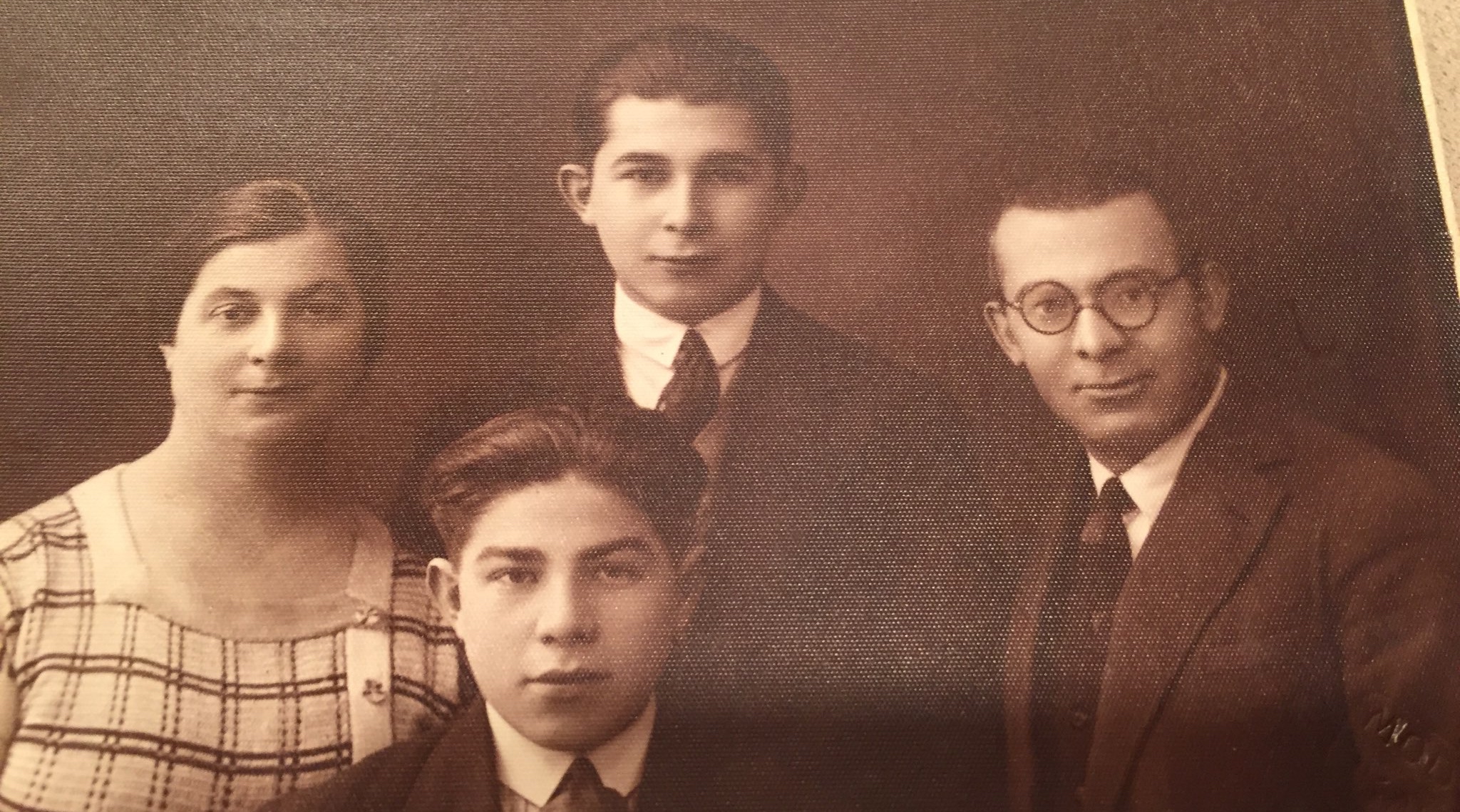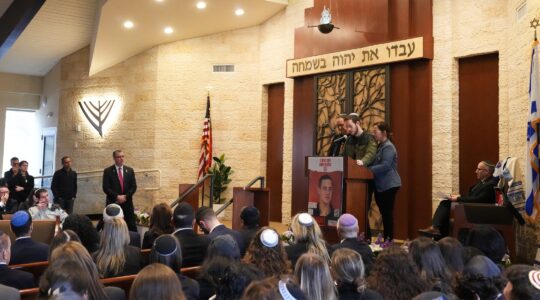WASHINGTON (JTA) — Visiting his uncle Reuben in his Washington D.C. law office when he was a teenager, something seemed amiss for Barry Effron.
“There was a wooden desk, and a couple of wooden chairs, [but] there were no bookcases,” he recalled of the visit, which would have taken place in the late 1960s or early 1970s.
Lawyers frequently have legal volumes at arm’s reach, but the absence of bookshelves wasn’t the first gap that Barry and his dad, Irving, had noticed when it came to Irving’s brother. “He had traveled a lot, yet he had no visible means of support,” Effron said this month in an interview.
Reuben Efron did, in fact, have a good job, one that would have come with a pension and a generous expense account. He was a CIA spy, and documents recently declassified by the Biden administration show that Efron was involved in tracking John F. Kennedy’s assassin, Lee Harvey Oswald, in the years prior.
After that revelation, the Jewish Telegraphic Agency uncovered another side to Efron: a scholar who after his retirement wrote passionately about spies in the Bible, applying the spycraft he learned on the job to assess figures as diverse as Joshua, David and Rahab the courtesan.
Reuben Efron was expansive about his Orthodox faith, Barry Effron recalled, urging Barry to intensify his Jewish observance. “He talked mostly about Judaism, about being religious and being righteous, being prayerful.”
Jewish spies have at times been integral to the American intelligence complex, and at others have been viewed as suspect because of their purported ties to Israel. Efron seems to have been among those who thrived in the service.
Abba Cohen, the Washington director of Agudath Israel of America, whose father was an Orthodox CIA agent, recalled in an email that his parents socialized with the Efrons when they lived in Washington in the 1970s, as members the Orthodox community.
“I would visit them for dinner after school sometimes, as the Rittenhouse where they lived was across the street from the Hebrew Academy on 16th Street,” he said. “Reuben was an extremely good-natured, low-key, scholarly and modest person.” The friendship between his parents and the Efrons continued after both couples moved to Israel, Cohen said.
After the D.C. visit, the Effrons, father and son, began to put two and two together. (Reuben Efron, the elder brother, and Irving Effron spelled their last names differently.)
“He didn’t have much of a law practice, he knew a lot of languages and he was very, very, very erudite, and he traveled a lot and he had a PhD in international affairs, and he wrote dense scholarly articles that appeared in places like Foreign Affairs Quarterly,” said Barry Effron, who is now a cardiologist in Cleveland. “We thought Reuben was in the CIA.”
The turmoil of the first half of the last century kept the brothers apart for years; Irving Effron was the first to come to the United States, finding work with uncles in Cleveland. Then he returned to their native Lithuania. He used his skills in English to return to the United States via England as Hitler’s shadow loomed larger over Europe; around the same time Reuben managed to arrive in the United States via Cuba. Their widowed mother perished in the Holocaust.
The brothers were not close, but they kept in touch and got together for major occasions; Reuben Efron attended Barry Effron’s bar mitzvah in Cleveland and his wedding in Columbus, and Irving and his wife attended Reuben’s late-in-life wedding to Edna, the “spinster” secretary at the Orthodox synagogue in Miami where Reuben prayed.
The wedding was at the Fontainebleau. Efron in his retirement had purchased an apartment on ritzy Collins Avenue, and also a garden apartment on Keren Hayesod street in the heart of Jerusalem. For Barry Effron, the displays of wealth were additional evidence that there was more to his uncle than met the eye.
Lorri, Barry’s wife, chimed in during his interview, saying she recalled that Reuben Efron’s Jerusalem apartment was near those of government officials (he lived a five-minute walk away from the prime minister’s residence). “He used to have meetings,” she said. (Barry Effron did not recall that detail.)
When they visited him, whether it was in Miami or in Jerusalem, much of the conversation was about Jewish observance, Effron recalled.
“He was proud of his religion, he believed in Jewish law and he believed in kashrut, he believed in davening and all that so he was particularly interested in passing it on,” Effron said. “He had no children of his own, so he was interested in conveying his love of Judaism to his nephew and niece,” Barry’s sister.
He was taken with his great-nieces, Barry and Lorri Effron’s daughters. One had bright blue eyes; he would call her a “shayneh maydeleh,” Yiddish for pretty girl. One of the last times they saw him before he died in 1993, at a home for the elderly in Florida, the girls joined him in Shabbat prayers.
Barry’s family was all Reuben had, Barry Effron said, besides his wife, Edna. “He had my dad and then he had my sister and me,” he said.
Irving Effron was proud of his brother. Effron recalled that his father kept copies of Foreign Policy Quarterly, with its august gray cover and its thick interiors paginated by volume instead of by issue, inside a desk drawer. He was thrilled to see his brother’s name on the same contents page that had featured luminaries like Henry Kissinger.
“My dad was very proud of it, even though he probably didn’t understand the article and of course I didn’t as a young kid or a teenager, but that was pretty exciting,” Effron said.
After Reuben Efron died in 1993 and Irving Effron died in 1996, Barry Effron took to searching for clues about his uncle on the Internet. He soon realized that his and his father’s guess, that Reuben was a CIA agent, was correct.
One piece of evidence was Efron’s presence as a translator for Marina Oswald, the assassin’s Russian-speaking widow, when she was interrogated by the congressional committee investigating the assassination. Another was his uncle’s involvement in the alleged sighting of a UFO in the Soviet Union, while accompanying U.S. Sen. Richard Russell, a Georgia Democrat on a visit to the Soviet Union.
“The guy’s traveling in Russia at the height of the Cold War in 1957, with a congressman, he’s obviously a CIA attache of some kind,” he said.
Barry Effron was in Israel recently for a wedding. He sought out the Keren Hayesod address where his uncle once lived.
“It’s now a very wealthy area in Jerusalem,” he said. He would have ventured closer, but he couldn’t find parking.
JTA has documented Jewish history in real-time for over a century. Keep our journalism strong by joining us in supporting independent, award-winning reporting.






